
Objects, Structures, and Logics: FilMat Studies in the Philosophy of Mathematics PDF
Preview Objects, Structures, and Logics: FilMat Studies in the Philosophy of Mathematics
Boston Studies in the Philosophy and History of Science 339 Gianluigi Oliveri Claudio Ternullo Stefano Boscolo Editors Objects, Structures, and Logics FilMat Studies in the Philosophy of Mathematics Boston Studies in the Philosophy and History of Science Volume 339 SeriesEditors AlisaBokulich,BostonUniversity JürgenRenn,MaxPlanckInstitutefortheHistoryofScience ManagingEditor LindyDivarci,MaxPlanckInstitutefortheHistoryofScience FoundingEditor RobertS.Cohen EditorialBoardMembers TheodoreArabatzis,UniversityofAthens HeatherE.Douglas,UniversityofWaterloo KostasGavroglu,UniversityofAthens ThomasF.Glick,BostonUniversity HubertGoenner,UniversityofGoettingen JohnHeilbron,UniversityofCalifornia,Berkeley DianaKormos-Buchwald,CaliforniaInstituteofTechnology ChristophLehner,MaxPlanckInstitutefortheHistoryofScience PeterMcLaughlin,UniversitätHeidelberg AgustíNieto-Galan,UniversitatAutònomadeBarcelona NuccioOrdine,UniversitádellaCalabria AnaSimões,UniversidadedeLisboa JohnJ.Stachel,BostonUniversity BaichunZhang,ChineseAcademyofScience TheseriesBostonStudiesinthePhilosophyandHistoryofSciencewasconceived in the broadest framework of interdisciplinary and international concerns. Natural scientists, mathematicians, social scientists and philosophers have contributed to the series, as have historians and sociologists of science, linguists, psychologists, physicians,andliterarycritics. Theserieshasbeenabletoincludeworksbyauthorsfrommanyothercountries aroundtheworld. The editors believe that the history and philosophy of science should itself be scientific, self-consciously critical, humane as well as rational, sceptical and undogmaticwhilealsoreceptivetodiscussionoffirstprinciples.Oneoftheaimsof Boston Studies, therefore, is to develop collaboration among scientists, historians andphilosophers. BostonStudiesinthePhilosophyandHistoryofSciencelooksintoandreflects on interactions between epistemological and historical dimensions in an effort to understandthescientificenterprisefromeveryviewpoint. Moreinformationaboutthisseriesathttps://link.springer.com/bookseries/5710 Gianluigi Oliveri (cid:129) Claudio Ternullo Stefano Boscolo Editors Objects, Structures, and Logics FilMat Studies in the Philosophy of Mathematics Editors GianluigiOliveri ClaudioTernullo AccademiaNazionaledelleScienze,Lettere DepartamentdeMatema`tiquesiInforma`tica edArtidiPalermo UniversitatdeBarcelona Universita`diPalermo Barcelona,Spain Palermo,Italy StefanoBoscolo DipartimentodiFilosofiaeBeniCulturali Universita`diVeneziaCa’Foscari Trevio,Italy ISSN0068-0346 ISSN2214-7942 (electronic) BostonStudiesinthePhilosophyandHistoryofScience ISBN978-3-030-84705-0 ISBN978-3-030-84706-7 (eBook) https://doi.org/10.1007/978-3-030-84706-7 ©TheEditor(s)(ifapplicable)andTheAuthor(s),underexclusivelicensetoSpringerNatureSwitzerland AG2022 Thisworkissubjecttocopyright.AllrightsaresolelyandexclusivelylicensedbythePublisher,whether thewholeorpartofthematerialisconcerned,specificallytherightsoftranslation,reprinting,reuse ofillustrations,recitation,broadcasting,reproductiononmicrofilmsorinanyotherphysicalway,and transmissionorinformationstorageandretrieval,electronicadaptation,computersoftware,orbysimilar ordissimilarmethodologynowknownorhereafterdeveloped. Theuseofgeneraldescriptivenames,registerednames,trademarks,servicemarks,etc.inthispublication doesnotimply,evenintheabsenceofaspecificstatement,thatsuchnamesareexemptfromtherelevant protectivelawsandregulationsandthereforefreeforgeneraluse. Thepublisher,theauthorsandtheeditorsaresafetoassumethattheadviceandinformationinthisbook arebelievedtobetrueandaccurateatthedateofpublication.Neitherthepublishernortheauthorsor theeditorsgiveawarranty,expressedorimplied,withrespecttothematerialcontainedhereinorforany errorsoromissionsthatmayhavebeenmade.Thepublisherremainsneutralwithregardtojurisdictional claimsinpublishedmapsandinstitutionalaffiliations. ThisSpringerimprintispublishedbytheregisteredcompanySpringerNatureSwitzerlandAG Theregisteredcompanyaddressis:Gewerbestrasse11,6330Cham,Switzerland Contents 1 Introduction................................................................. 1 GianluigiOliveri,ClaudioTernullo,andStefanoBoscolo PartI MathematicalObjects 2 Aristotle’sProblem......................................................... 17 LucaZanetti 3 Hofweber’sNominalistNaturalism....................................... 31 EricSnyder,RichardSamuels,andStewartShapiro 4 ExploringMathematicalObjectsfromCustom-Tailored MathematicalUniverses ................................................... 63 IngoBlechschmidt 5 RescuingImplicitDefinitionfromAbstractionism ..................... 97 DanielWaxman PartII StructuresandStructuralisms 6 StructuralRelativityandInformalRigour.............................. 133 NeilBarton 7 Ontological Dependence and Grounding for a Weak MathematicalStructuralism .............................................. 175 SilviaBianchi 8 TheStructuralistMathematicalStyle:BourbakiasaCaseStudy.... 199 Jean-PierreMarquis 9 Grothendieck Toposes as Unifying ‘Bridges’: A MathematicalMorphogenesis............................................. 233 OliviaCaramello v vi Contents PartIII LogicsandProofs 10 GameofGrounds........................................................... 259 DavideCattaandAntonioPiccolominid’Aragona 11 PredicativityandConstructiveMathematics............................ 287 LauraCrosilla 12 TruthandthePhilosophyofMathematics............................... 311 AndreaCantini 13 OnLakatos’sDecompositionoftheNotionofProof.................... 331 EnricoMoriconi 14 ACategoricalReadingoftheNumericalExistenceProperty inConstructiveFoundations .............................................. 349 SamueleMaschio About the Editors ClaudioTernullo (PhD Liverpool, 2012) is currently Beatriu de Pinós (Marie- Skłodowska Curie Actions COFUND) Postdoctoral Fellow at the University of Barcelona.Previously,hehasheldpositionsaspost-docattheKurtGödelResearch Center for Mathematical Logic at the University of Vienna and at the University of Tartu. His research interests lie in logic and the philosophy of mathematics, in particular in the philosophy of set theory. His work focuses on the set-theoretic multiverse, new axioms (and their justification), and mathematical platonism (in particular, Gödel’s Platonism). He has also done work on issues in ancient and medievalphilosophy. StefanoBoscolo (PhD Palermo, 2016) is an IT Solution Architect at Volkswagen Group.Hiscurrentareasofexpertiseareadvancedanalytics,cloudcomputing,and machine learning. After receiving his PhD in Logic and Philosophy of Science, he worked at Ca’ Foscari University of Venice on truth pluralism. Throughout his academiccareer,heworkedonthephilosophyofmathematics,inparticularonthe debate between platonism and anti-platonism. His current research interests range fromnatural-languageprocessingtodeepneuralnetworks. GianluigiOliveriobtainedalaurea(BA)inphilosophyfromtheUniversityofBari (Italy).Afterthat,hereceivedaDPhilinphilosophyfromtheUniversityofOxford (GB)andaPhDincognitivesciencefromtheUniversityofMessina(Italy). His research interests range from the philosophy of mathematics, artificial intelli- gence,andthephilosophyofsciencetometaphysicsandthehistoryofphilosophy. He has held teaching and research posts at the universities of Reading, Leeds, Keele, Oxford, and Palermo, and has been a visiting scholar at the Sydney Centre for the Foundations of Science, University of Sydney, Australia. He is, currently, Associate Professor of Logic and the Philosophy of Science at the University of vii viii AbouttheEditors Palermo (Italy); corresponding member of the Accademia Nazionale di Scienze, Lettere ed Arti di Palermo (National Academy of Sciences, Letters and Arts of Palermo); and chairman of the Centro Interdipartimentale per le Tecnologie della Conoscenza (Interdepartmental Centre for the Technologies of Knowledge) at the UniversityofPalermo. Contributors N.BartonFachbereichPhilosophie,UniversityofKonstanz,Konstanz,Germany S.BianchiUniversitySchoolforAdvancedStudies(IUSS),Pavia,Italy I.BlechschmidtInstitutfürMathematik,UniversitätAugsburg,Augsburg, Germany A.CantiniDILEF,UniversitàdiFirenze,Firenze,Italy O.Caramello Dipartimento di Scienza e Alta Tecnologia, Università degli Studi dell’Insubria,Como,Italy InstitutdesHautesÉtudesScientifiques,Bures-sur-Yvette,France D.CattaLIRMM–MontpellierUniversity,Montpellier,France L.Crosilla Department of Philosophy, IFIKK, University of Oslo, Blindern, Norway A.P.d’Aragona Centre Gilles Gaston Granger, Aix-Marseille Univ, CNRS, Aix-en-Provence,France J.-P.MarquisDépartementdePhilosophie,UniversitédeMontréal,Montréal,QC, Canada S.MaschioDipartimentodiMatematica“TullioLevi-Civita”,Padova,Italy E.MoriconiDepartmentofCivilisationsandFormsofKnowledge,viaP.Paoli15, Pisa,Italia R.SamuelsOhioStateUniversity,Columbus,OH,USA S.ShapiroOhioStateUniversity,Columbus,OH,USA E.SnyderLMU,Munich,Germany ix
